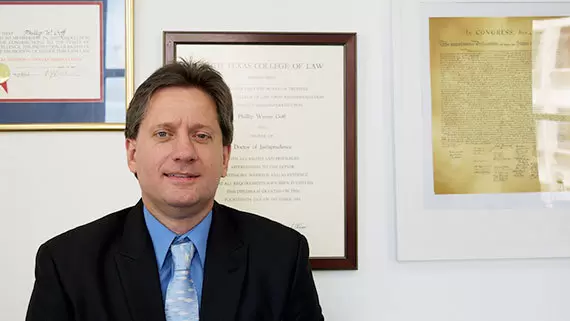
UPDATE: The now former CCPD officer was sentenced to 10 years in prison for continuous family violence and other felonies on July 2, 2019.
Corpus Christi Police Department Senior Officer Tommy Cabello was arrested Friday a second time for assault involving a family member. His previous charge also involved a family member. One has to wonder whether police accountability exists or where it starts.
The two appear to have a family relationship by marriage. Cops are statistically more likely to be abusive toward family members, and reporting of such violence may be extremely underreported, so the story isn’t surprising.
In his most recent arrest, Cabello reportedly went uninvited to where Davila was and started the fight. On the surface, those two actions indicate poor judgment and physical aggression, neither of which should be a tolerable trait of police officers. If those personal traits exist in a person off duty, how would they magically be absent on duty?
Cabello’s arrests highlight a bigger concern throughout the United States. This blog entry does not call for Cabello’s prosecution, nor does it suggest he is guilty of a crime. Instead, the discussion is about what should be done going forward outside of courts.
The question becomes not so much whether a particular cop is a criminal, but whether police officers should always be allowed to remain cops, especially after repeated accusations, especially those resulting in criminal charges and domestic violence. This is particularly of concern when considering physical force and trustworthiness.
At what point will a cop be denied any opportunity to continue being a cop? Cops have extraordinary power, including the virtually unchecked choice to use whatever amount and means of force they deem necessary for a given circumstance. Even if actions can be reviewed at a later time, the damage done is not undone by such a review.
Cabello’s previous arrest not only stemmed from a domestic violence charge; it included an allegation he tampered with a home surveillance cameras, presumably because security footage would have been damning to him. Inexplicably, those cases were dismissed. Media reports were notably silent about why the charges were dropped. Perhaps they were dismissed specifically because he destroyed the evidence against him. We may never know.
However, if there was enough evidence to arrest and indict an officer for tampering with evidence, one can reasonably surmise it would be prudent not to entrust such a person with police powers.
Evidence may have been short of a criminal conviction and imprisonment, but the standard in criminal cases is the highest burden of proof at trial, that being evidence of guilt “beyond a reasonable doubt”. Simply because that standard wasn’t met does not equal “being cleared”, as was reported by KIII-TV in 2010. Evidence can be very strong and still not be good enough for criminal conviction.
Th public deserves to be protected from police who are dangerous. Even if a criminal prosecution failed, the evidence might be enough to be very certain intolerable misconduct occurred. Civil liability’s burden of proof is merely “more likely than not”. If the civil standard were sought, what would have been the result?
CCPD suspended Cabello three days for his conduct when police responded to the scene in 2010. Clearly, something was wrong because suspensions are relatively unusual in almost every circumstance. The suspension demonstrates CCPD considered YET ANOTHER incident of poor conduct by Cabello, apart from his criminal charges.
Complaints against officer are difficult to unearth, but it would be interesting to know how many complaints have been made against Cabello. If the number is large, his superiors should be called out for tolerating and encouraging misconduct through their inaction. If no complaint has ever been filed, is it because Cabello conducts himself as a model officer while on duty? Who knows?
One thing is sure: scrutiny of Cabello’s conduct is warranted, at the very least. Whatever leash there is for his future conduct should understandably be short, if there is one at all.
CCPD brass and city leaders have an obligation to expect better from police they employ. If the standards are not already in place, if they are not removing police from the force who should be gone, or if future police misconduct harms someone, all involved are on notice and should be held accountable.
People who are lawfully authorized to use the force of government against people must be held to a higher standard. We cannot tolerate police officers who cannot control their tempers, resort to violence unjustifiably, and are quick to escalate situations. De-escalation should be trained and emphasized at every opportunity. Physical force, especially deadly force, should be the last resort and only grudgingly used.
Vigilance is required when employing and supervising police. The public has good reason to pay careful attention to how the most recent incident is handled.
UPDATE: It is with no joy I update this blog. I’ve been practicing long enough to know allegations can be weak or downright false. Nonetheless, this is not so much about whether he’s guilty beyond a reasonable doubt so as to be worthy of criminal punishment. It is more about what standards of conduct are acceptable for police. Mr. Cabello has been indicted for three new charges related to domestic violence in early 2019.